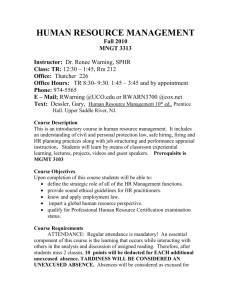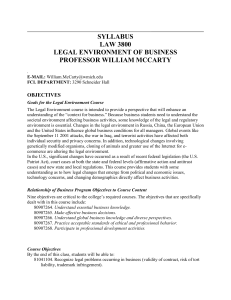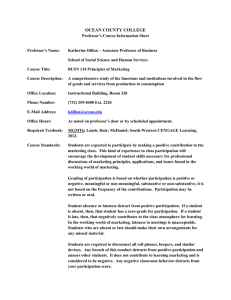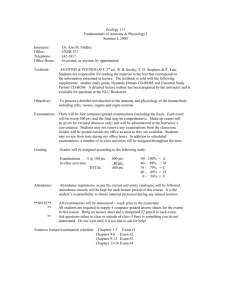FA 14 ACCT 3110 Hutton (v2) - UVaCollab
advertisement
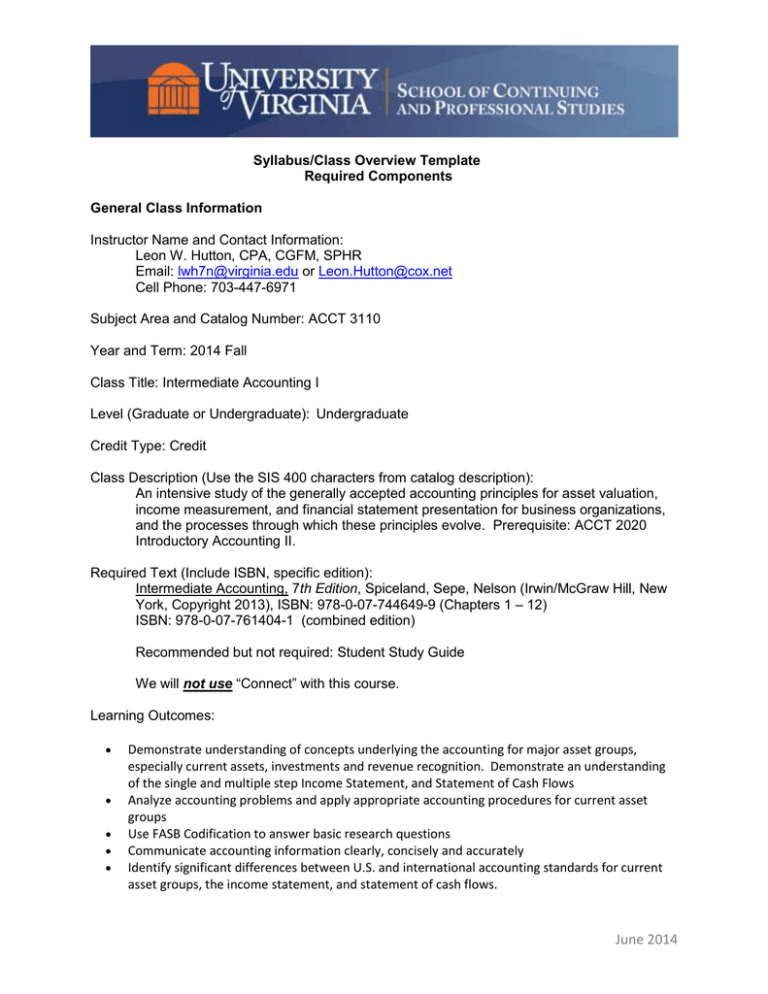
Syllabus/Class Overview Template Required Components General Class Information Instructor Name and Contact Information: Leon W. Hutton, CPA, CGFM, SPHR Email: lwh7n@virginia.edu or Leon.Hutton@cox.net Cell Phone: 703-447-6971 Subject Area and Catalog Number: ACCT 3110 Year and Term: 2014 Fall Class Title: Intermediate Accounting I Level (Graduate or Undergraduate): Undergraduate Credit Type: Credit Class Description (Use the SIS 400 characters from catalog description): An intensive study of the generally accepted accounting principles for asset valuation, income measurement, and financial statement presentation for business organizations, and the processes through which these principles evolve. Prerequisite: ACCT 2020 Introductory Accounting II. Required Text (Include ISBN, specific edition): Intermediate Accounting, 7th Edition, Spiceland, Sepe, Nelson (Irwin/McGraw Hill, New York, Copyright 2013), ISBN: 978-0-07-744649-9 (Chapters 1 – 12) ISBN: 978-0-07-761404-1 (combined edition) Recommended but not required: Student Study Guide We will not use “Connect” with this course. Learning Outcomes: Demonstrate understanding of concepts underlying the accounting for major asset groups, especially current assets, investments and revenue recognition. Demonstrate an understanding of the single and multiple step Income Statement, and Statement of Cash Flows Analyze accounting problems and apply appropriate accounting procedures for current asset groups Use FASB Codification to answer basic research questions Communicate accounting information clearly, concisely and accurately Identify significant differences between U.S. and international accounting standards for current asset groups, the income statement, and statement of cash flows. June 2014 Assessment Components: 3 Examinations (30 points each) Level and Quality of Participation (participating in class discussions, asking contemplative questions on class discussions, student presentations, attendance) Homework 90% 5% 5% Examinations All scheduled examinations will be held in our classroom and will begin at regular class time. Each examination has a 3 hour time limit. Each examination is closed book and closed notes. You are expected to be present and to complete each exam on each date identified in the Course Schedule. Delivery Mode Expectations: This course is instructor-led, lecture format, face-to-face delivery mode. Class will meet weekly on Wednesday nights from 6:30PM to 10PM, from September 3 to December 10. No class meeting on October 15 or November 26. Regular attendance at all classes is expected. Required Technical Resources and Technical Components: Active UVa Computing ID and password to access the Student Information System (SIS). Technical support contact for login/password: email SCPSHelpdesk@virginia.edu. Class Specific Information Class Instruction and Activities: This course will use a combination of lecture/discussion and problem solving. Since this class is quantitative in nature, preparation is always important. Prior to each class, students are expected to have completed the assigned reading. Lectures may not cover every topic in detail. I encourage each student to also review and attempt to complete the assigned problems. We will cover each assigned problem in detail during class. The assigned problems are identified in the Course Schedule. Please participate in class by asking questions and/or making observations. In addition, we will discuss, as appropriate, cases illustrating technical issues related to accounting practices, policies, and standards. These cases may be pulled from current events as published in newspapers such as The Wall Street Journal, Washington Post, professional journals such as The Journal of Accountancy, and monthly journals issued by professional organizations such as the Virginia Society of CPAs. As a course requirement, each student should identify, summarize and present information about one relevant article or event during the semester - further details will be discussed at the beginning of the semester. FASB Codification Student Access: http://aaahq.org/ascLogin.cfm Student Access Username - AAA53195 Password – G6Y3dpF (Sep ‘14 – Sep ‘15) June 2014 Useful Websites: AICPA www.aicpa.org/BecomeACPA/CPAExam/ForCandidates/HowToPrepare/Downloada bleDocuments/New_2011_CPA_exam_guide_to_CBTe.pdf http://www.aicpa.org/BecomeACPA/CPAExam/Pages/CPAExam.aspx Class Requirements: Regular attendance at all classes and class participation are expected. Class participation and timely submission of assignments will be considered for grading purposes. Students are expected to have completed assigned reading prior to each class. Students are encouraged to review and attempt to complete assigned problems. Evaluation Standards and Assessments: Course Grading: 3 Examinations (30 points each) Level and Quality of Participation (participating in class discussions, asking contemplative questions on class discussions, student presentations, attendance) Homework 90% 5% 5% All scheduled examinations will be held in our classroom and will begin at regular class time. Each examination has a 3 hour time limit. Each examination is closed book and closed notes. You are expected to be present and to complete each exam on each date identified in the Course Schedule. Grading Scale: 90-100 points = A 80-89 points = B 70-79 points = C 60-69 points = D Below 60 =F The following illustrates how your examination scores, outside case and level and quality of participation will be used to compute your final course grade. Assume that you score 90 on each of the three examinations. Your final grade will be computed as follows: 90 + 90 + 90 = 270 /3 = 90 * .75 weight = 67.5 67.5 + 10 (level and quality of participation) + 5 (HW #1) + 10 (HW #2) = 92.5 The final course grade, for this illustration, is “A”. June 2014 Class Schedule: Class Date Topic 1 Sep 3 2 Sep 10 3 Sep 17 4 Sep 24 Introductions, Chapters 1 and 2: The Environment and Theoretical Structure of Financial Accounting (1); Review of the Accounting Process (2) Chapter 3: The Balance Sheet and Financial Disclosures Chapter 4: The Income Statement and Statement of Cash Flows Chapter 5: Income Measurement and Profitability Analysis; Assignment – Homework assignments will be provided at the first class session Review for Exam #1 5 Oct 1 6 7 Oct 8 Oct 15 Oct 22 8 Oct 29 9 10 Nov 5 Nov 12 11 12 Nov 19 Nov 26 Dec 3 13 Dec 10 Chapters 6 and 7: Time Value of Money Concepts (6) & Cash and Receivables (7) Exam #1 (Chapters 1- 4) No class Chapters 7 and 8: Cash and Receivables, cont (7) & Inventories – Measurement (8) Chapters 9 and 10: Inventories - Additional Issues w/Inventories (9), and Operational Assets: Acquisition and Disposition (11) Exam# 2 (Chapters 5 – 8) Chapter 11: Operational Assets: Utilization and Impairment Chapter 12: Investments No class – Thanksgiving Holiday! Student Presentations, Review for Exam #3 Exam# 3 (Chapters 9 – 12) At the end of each chapter are “CPA and CMA Exam Questions.” Students planning to sit for either exam should invest the extra time to complete those questions. Answers will be provided upon request. The authors also provide “Alternative Problems.” Answers to these problems will also be provided upon request. Communication & Student Response Time: Please communicate to me via email - I will respond to your email question(s) within 48 hours, usually sooner. Assignments: Grading: Grading scale – the final grade will be computed as follows: 90-100 points = A 80-89 points = B 70-79 points = C June 2014 60-69 points Below 60 =D =F Please visit www.scps.virginia.edu/audience/students/grades for more information Technical Specifications: Computer Hardware Computer with basic audio/video output equipment. Internet Access Technical Support Contacts Login/Password: scpshelpdesk@virginia.edu UVaCollab: collab-support@virginia.edu BbCollaborate (Elluminate) Support: http://support.blackboardcollaborate.com UVa Policies SCPS Grading Policies: Courses carrying a School of Continuing and Professional Studies subject area use the following grading system: A+, A, A-; B+, B, B-; C+, C, C-; D+, D, D-; F. S (satisfactory) and U (unsatisfactory) are used for some course offerings. For noncredit courses, the grade notation is N (no credit). Students who audit courses receive the designation AU (audit). The symbol W is used when a student officially drops a course before its completion or if the student withdraws from an academic program of the University. Please visit www.scps.virginia.edu/audience/students/grades for more information. Attendance: Students are expected to attend all class sessions. Instructors establish attendance and participation requirements for each of their courses. Class requirements, regardless of delivery mode, are not waived due to a student's absence from class. Instructors will require students to make up any missed coursework and may deny credit to any student whose absences are excessive. Instructors must keep an attendance record for each student enrolled in the course to document attendance and participation in class. University Email Policies: Students are expected to check their official UVa email addresses on a frequent and consistent basis to remain informed of University communications, as certain communications may be time sensitive. Students who fail to check their email on a regular basis are responsible for any resulting consequences. University of Virginia Honor System: All work should be pledged in the spirit of the Honor System at the University of Virginia. The instructor will indicate which assignments and activities are to be done individually and which permit collaboration. The following pledge should be written out at the end of all quizzes, examinations, individual assignments and papers: “I pledge that I have neither given nor received help on this examination (quiz, assignment, etc.)”. The pledge must be signed by the student. For more information, visit www.virginia.edu/honor. Special Needs: It is the policy of the University of Virginia to accommodate students with disabilities in accordance with federal and state laws. Any SCPS student with a disability who needs accommodation (e.g., in arrangements for seating, extended time for examinations, or note-taking, etc.), should contact the Student Disability Access Center (SDAC) and provide them with appropriate medical or psychological documentation of his/her condition. Once accommodations are approved, it is the student’s responsibility to follow up with the instructor about logistics and implementation of accommodations. Accommodations for test taking should be arranged at least 14 business days in advance of the date of the test(s). Students with disabilities are encouraged to contact the SDAC: 434-243-5180/Voice, 434-465-6579/Video Phone, 434-243-5188/Fax. Further policies and statements are available at www.virginia.edu/studenthealth/sdac/sdac.html June 2014 For further policies and statements about student rights and responsibilities, please visit www.scps.virginia.edu/audience/students June 2014
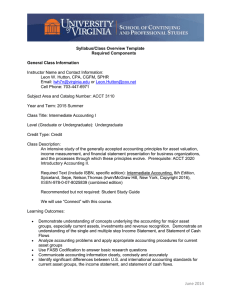
![SCPS_SyllabusTemplate[1] - UVaCollab](http://s2.studylib.net/store/data/010222220_1-7efb1d94390053f4de94e473fa262bcc-300x300.png)
